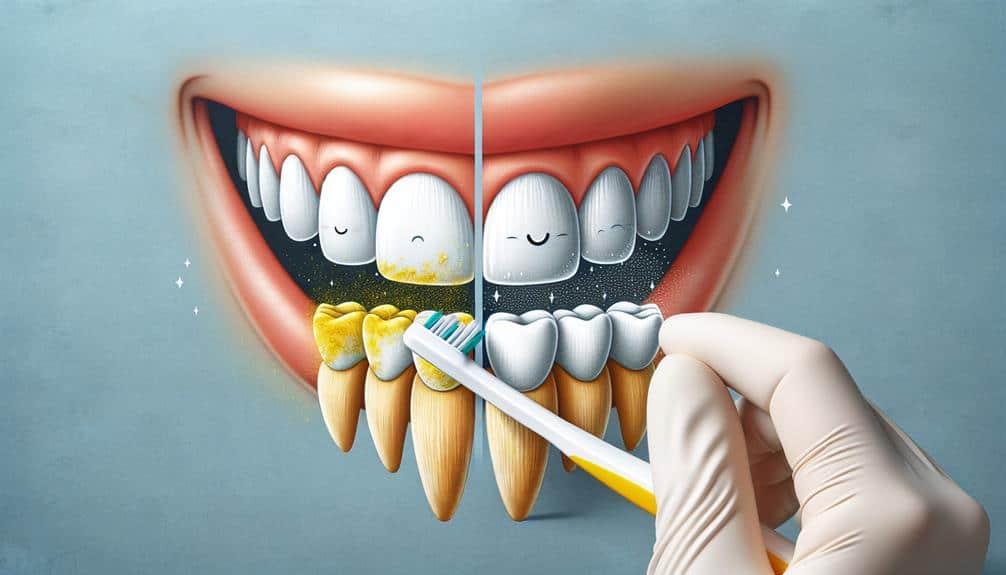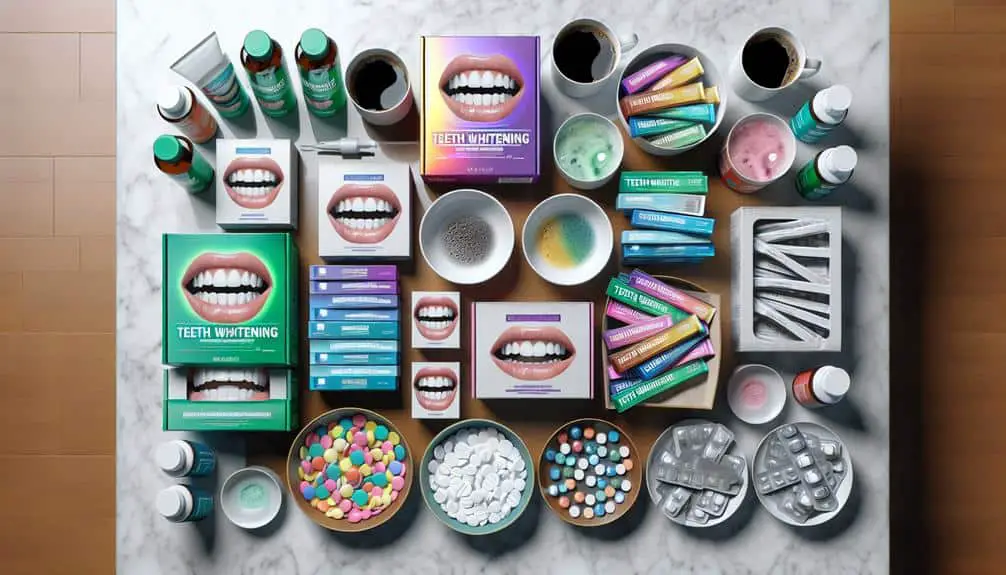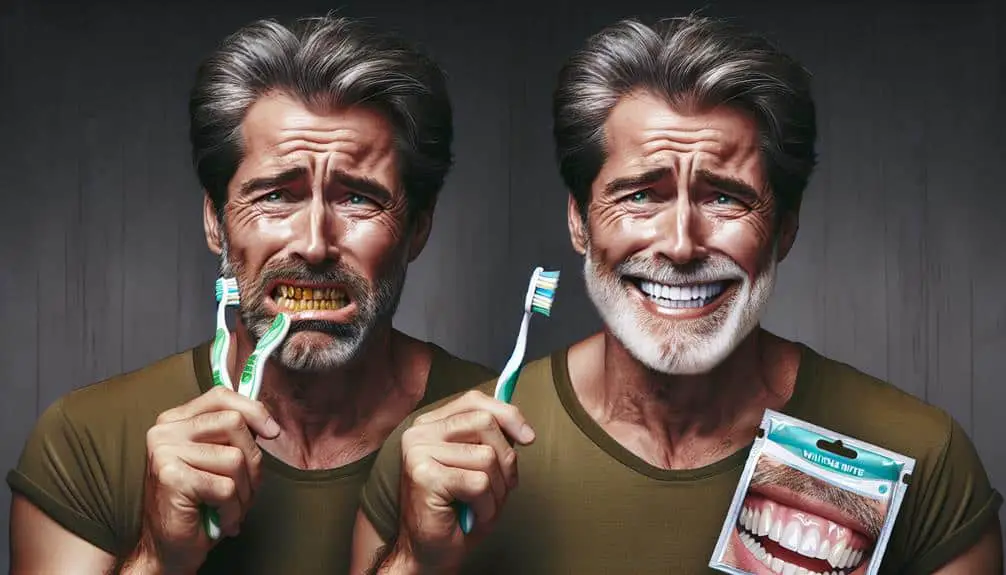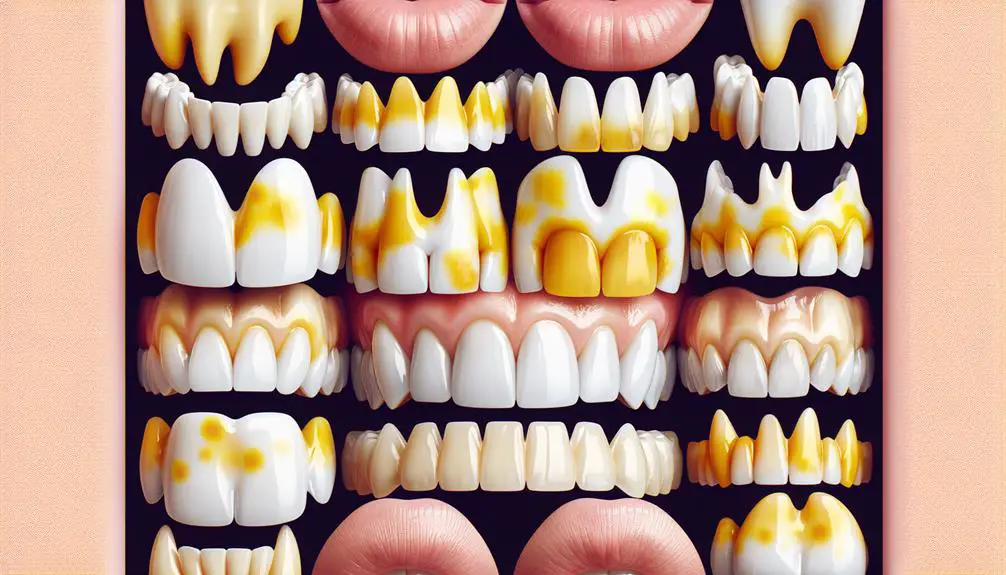To remove medication stains on your teeth, focus on good oral hygiene habits. Use a soft-bristled brush at a 45-degree angle, brushing gently for two minutes, twice daily. Consider whitening toothpaste for sensitive teeth with enamel protection. Professional treatments offer quick results, with in-office and at-home options available. Natural remedies like activated charcoal and baking soda can aid in stain removal. For detailed steps and additional tips to effectively combat medication stains and maintain a bright smile, explore the detailed guide provided.
Key Points
- Maintain good oral hygiene practices to prevent medication stains.
- Consider professional whitening treatments for effective stain removal.
- Use whitening toothpaste tailored to enamel protection and sensitivity.
- Implement natural remedies like activated charcoal and baking soda.
- Regular dental check-ups can help detect and treat medication stains early.
Understanding Medication Stains on Teeth
When taking certain medications, you may notice discoloration on your teeth, known as medication stains. These stains can be caused by various factors, such as the ingredients in the medication reacting with your tooth enamel or the medication's tendency to dry out your mouth, leading to a buildup of plaque and bacteria. Some medications like antihistamines, antipsychotics, and high blood pressure drugs are more likely to cause staining.
Prevention is key when it comes to medication stains on teeth. One effective way to prevent these stains is by maintaining good oral hygiene practices. Brushing your teeth at least twice a day with a fluoride toothpaste and flossing daily can help remove plaque buildup and prevent staining. Additionally, using a mouthwash that helps restore pH balance in your mouth can reduce the risk of discoloration. It's also essential to stay hydrated while taking medication to combat dry mouth, which can contribute to staining. Regular dental check-ups and professional cleanings can aid in early detection and treatment of medication stains.
Proper Brushing Techniques
To maintain ideal oral health and prevent medication stains on your teeth, it's essential to master proper brushing techniques. Essential technique is vital for effective plaque removal and preventing stains. Start by selecting a soft-bristled toothbrush that fits comfortably in your hand and can reach all areas of your mouth. Hold the brush at a 45-degree angle to your gums and use gentle, circular motions to clean the front, back, and chewing surfaces of your teeth. Be sure to brush for at least two minutes, twice a day, and don't forget to brush your tongue to remove bacteria and freshen your breath.
Developing good brushing habits is key to keeping your teeth free from medication stains. Avoid brushing too hard, as this can damage your enamel and irritate your gums. Remember to replace your toothbrush every three to four months or sooner if the bristles become frayed. Consistency in your brushing routine and attention to detail will help maintain a healthy, bright smile.
Whitening Toothpaste Recommendations
Consider trying out whitening toothpaste products to enhance the brightness of your smile. When selecting a whitening toothpaste, look for formulas that cater to your specific needs, such as teeth sensitivity and enamel protection. Whitening toothpaste options are available over the counter and can be a convenient way to maintain a brighter smile at home.
To address teeth sensitivity, opt for whitening toothpaste that's specifically designed for sensitive teeth. These formulations typically contain ingredients that help to minimize discomfort while still effectively removing surface stains. Additionally, for individuals concerned about enamel protection, seek out whitening toothpaste that's gentle on the enamel. Look for products that mention enamel protection on the packaging or contain fluoride to help strengthen the enamel.
Professional Whitening Treatments
For enhancing the brightness of your smile with professional results, consider exploring professional whitening treatments provided by dental professionals. In-office procedures offer a quick and effective way to whiten your teeth under the supervision of experts. These treatments typically involve the application of a whitening agent to your teeth, which is then activated using a special light or laser to accelerate the whitening process. The advantage of in-office procedures is the immediate and noticeable results they provide.
On the other hand, at-home solutions prescribed by your dentist can also be an option for those looking for more flexibility. Your dentist may provide custom trays along with a whitening gel for you to use at home. While these treatments may take longer to show results compared to in-office procedures, they can still be effective in improving the color of your teeth.
Discuss with your dental professional to determine the best whitening treatment option that suits your needs and preferences.
Natural Remedies for Stain Removal
When looking to naturally remove stains from your teeth, explore effective home remedies that can help improve the appearance of your smile. Herbal remedies have been used for centuries to address various health and beauty concerns, including dental care. One popular herbal remedy for teeth whitening is using activated charcoal. Activated charcoal has natural adhesive qualities that can bind to stains on the teeth, helping to remove them effectively. Another herbal option is baking soda, which is known for its mild abrasive properties that can gently scrub away surface stains.
DIY solutions can also be beneficial in tackling teeth stains. One common DIY method is oil pulling with coconut oil. This involves swishing a tablespoon of coconut oil in your mouth for about 15-20 minutes to help remove plaque and stains. Additionally, creating a paste using hydrogen peroxide and baking soda can act as a natural whitening agent when used occasionally. Remember, while these natural remedies can be effective, it's crucial to use them in moderation to avoid damaging your enamel.
Frequently Asked Questions
Can Medication Stains on Teeth Be Prevented or Minimized in Any Way?
To prevent or minimize medication stains on teeth, consider preventive measures like using a straw for staining beverages. Treatment options include professional dental cleanings and teeth whitening procedures. Consistent oral hygiene is key to maintaining a bright smile.
Are There Any Specific Foods or Drinks That Can Contribute to Medication Stains on Teeth?
To prevent medication stains on your teeth, be mindful of your dietary habits. Certain foods and beverages like coffee or red wine can worsen stains. Maintain excellent oral hygiene and consider adjusting brushing techniques to combat discoloration.
How Long Does It Typically Take for Medication Stains to Develop on Teeth?
You're in for a surprise! Medication stains on teeth don't play by your watch. Depending on factors like medication type and oral hygiene, these pesky stains can start making their mark in as little as a few weeks. Prevention techniques and treatment options are key.
Are There Any Specific Medications That Are More Likely to Cause Stains on Teeth?
Certain medications with ingredients like tetracycline can cause stubborn stains on teeth. Dentists recommend regular cleanings and professional teeth whitening to combat discoloration. Stay informed about medication side effects and seek dental advice.
Can Medication Stains on Teeth Worsen Over Time if Not Treated or Addressed?
Neglecting medication stains on teeth can lead to worsening discoloration over time. Failure to address this issue can have long-term consequences on your dental health, affecting your smile and overall confidence. Take action promptly.



